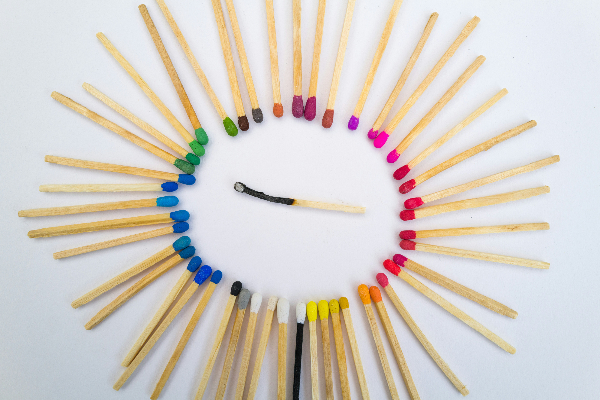3 Things to Grow a Resilient Heart

Last week I spoke with HITN Learning about how moms can nurture their resilience to deal with these challenging times (if you missed the conversation, check out the video.) During the event, I asked these moms “how are you feeling?” and was not surprised to read their answers—overwhelmed, anxious, scared… and the most popular: stressed.
High levels of stress for an extended period of time can have damaging consequences for our physical and psychological health. Constant stress can cause headaches, stomach problems or tense muscles. Stress can also impact our ability to focus, work with others and even accomplish simple daily tasks. Stress is a physical and emotional signal–it means that you are faced with very challenging and demanding circumstances. Researchers have found that the way we interpret that signal can completely transform the effect that stress has on us. If we perceive that we have the resources to cope with these difficult circumstances, we experience stress as a challenge. On the other hand, if we think that the situation exceeds our existing resources, we experience stress as a threat. This is an important distinction, because it shows that the way we interpret stress can impact our physical and emotional health.
During the online event, moms asked for tools and strategies to help them cope with this difficult reality. Although many of us cannot eliminate the current challenges, we can develop resources to deal with them more effectively by developing our resilience.
3 Things to Grow a Resilient Heart
Resilience means being able to adapt well in the face of adversity, threats, or significant sources of stress. Resilient adults and children do experience difficulty, but they have resources to face them and may experience personal growth because of these challenges. Resilience is a learnable mindset that everybody can develop starting today by nurturing 3 key things–awareness, gratitude and connection.
Awareness means that we notice and understand when something is happening. In our current situation, we might go from one activity to the next, without paying attention to our body sensations or the state of our minds. The thing is that mind and body are connected, and influence each other—when we experience physical discomfort, we may become depressed or anxious. At the same time, if we feel depressed or hopeless, we may be less inclined to take care of our bodies. Developing awareness means that we notice our thoughts, emotions, and the decisions we make to take care of our bodies and our minds.
- Move and fuel your body. Eat a healthy diet as much as possible and make sure you move your body every day—dancing to a favorite song counts too!
- Name your feelings. Put this on your fridge (Spanish) as a reminder to check-in and notice your emotions. If you have children or other adults at home with you, encourage them to use it as well.
- Recognize how hard this moment is. I have had frustrating days when I was trying to be super productive, while supporting the kids and taking care of the house. I had to remind myself—we are living through a pandemic. It is okay to lower expectations or take more time to accomplish tasks that were easily done before COVID-19. We are not living under normal circumstances.
- Find an activity to quiet your mind. I have been able to continue running outdoors. Moving my body helps me to burn stress and gets me ready to face the day. Think about an activity that is relaxing and rejuvenating for you—walking, reading, listening to music, talking to a friend, or mindful breathing—and try to do it consistently, even if it is just for a few minutes.
Gratitude means seeing the light in our daily lives. It can be difficult to maintain a positive outlook while reading the news and seeing all the negative consequences of this pandemic. Although it is important to be informed, we have choices about where we focus our attention. Choose to see the positive things happening in your family and community to nurture a sense of gratitude and increase your energy level.
- Notice the positive things and moments around you. This can be small moments, such as cuddling with your child, a moment of laughter, a funny mistake. When these moments occur, enjoy them.
- Be kind to yourself. As you are dealing with painful emotions, comfort and soothe yourself as you would with a good friend. Treat yourself with kindness by paying attention to your needs and appreciate who you are.
- Start a gratitude practice. Take time to notice and reflect on the things for which you are grateful. You can create a list when you wake up, journal before you go to bed or share with your family during a meal together. Practicing gratitude can help you nurture more positivity in your life. Printable handout for your fridge here (Spanish).
Connection means creating moments to nurture our relationships. Sheltering in place requires that we are physically apart from others, but it doesn’t mean that we stay emotionally disconnected. During this pandemic, it is important to keep in touch with our loved ones.
- Call friends and family. Stay in touch with your loved ones through video calls, text messages or zoom reunions. Practice social distancing in your neighborhood while still talking with your neighbors. Reach out to those who live by themselves.
- Give and receive emotional support. Reach out to those who may need your support, and be open to receive help as well. Many times it is easier to offer this help than accepting it from others. G
- Ask for help. When you are feeling overwhelmed and not sure how to move forward, ask for help. We all need support to weather this storm. Reach out!
Resilient adults and children have resources to cope with stress, setbacks and challenging situations. By nurturing awareness, gratitude and connection you can develop a resilient heart and help others do the same.
Stay safe and healthy. Stay home.
Subscribe to the HEART in Mind Newsletter
Research-Based Strategies for your SEL Toolbox









